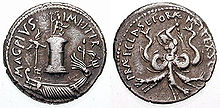
A denarius of Sextus Pompeius, minted for his victory over Octavian's fleet. On the obverse the Pharus of Messina, who defeated Octavian. On the reverse, the monster Scylla
Octavian and Lepidus launched a joint operation against Sextus in Sicily in 36 BC. Despite setbacks for Octavian, the naval fleet of Sextus Pompeius was almost entirely destroyed on 3 September by general Agrippa at the naval battle of Naulochus. Sextus fled with his remaining forces to the east, where he was captured and executed in Miletus by one of Antony's generals the following year. Both Lepidus and Octavian gathered the surrendered troops of Pompeius, yet Lepidus felt empowered enough to claim Sicily for himself, ordering Octavian to leave. However, Lepidus' troops deserted him and defected to Octavian since they were weary of fighting and found Octavian's promises of money to be enticing. Lepidus surrendered to Octavian and was permitted to retain the office of pontifex maximus (head of the college of priests), but was ejected from the Triumvirate, his public career at an end, and was effectively exiled to a villa at Cape Circei in Italy. The Roman dominions were now divided between Octavian in the West and Antony in the East. To maintain peace and stability in his portion of the Empire, Octavian ensured Rome's citizens of their rights to property. This time he settled his discharged soldiers outside of Italy while returning 30,000 slaves to former Roman owners that had previously fled to Pompeius to join his army and navy. To ensure his own safety and that of Livia and Octavia once he returned to Rome, Octavian had the Senate grant him, his wife, and his sister tribunal immunity, or sacrosanctitas.
0 comments:
Post a Comment